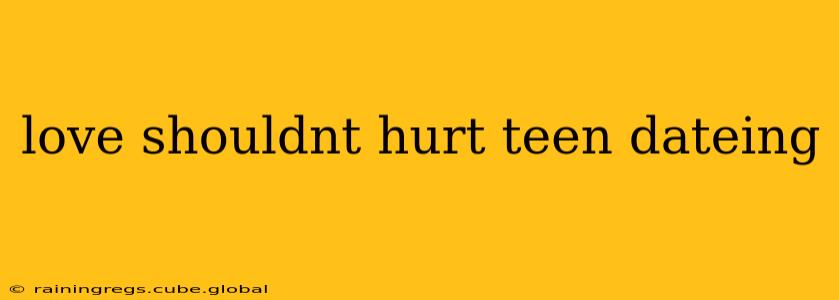Navigating the world of dating as a teenager can be exciting, confusing, and sometimes, even painful. While the thrill of a first crush or budding romance is undeniably captivating, it’s crucial to understand that healthy relationships are built on respect, trust, and mutual affection. Love should never involve hurt, control, or abuse. This guide will help teens understand the signs of unhealthy relationships and empower them to make safe and healthy choices.
What is Healthy Dating?
Healthy dating relationships are characterized by:
- Mutual Respect: Both partners value each other's opinions, feelings, and boundaries. They treat each other with kindness and consideration, even during disagreements.
- Trust and Honesty: Open communication and honesty are the cornerstones of a healthy relationship. Partners feel comfortable sharing their thoughts and feelings without fear of judgment or betrayal.
- Equality: Both partners have equal say in decisions and activities. Neither partner dominates or controls the other.
- Support and Encouragement: Partners support each other's goals and aspirations, offering encouragement and understanding during challenging times.
- Individuality: Maintaining a strong sense of self is vital. Healthy relationships allow for individual interests, friendships, and personal time.
- Consent: Consent is crucial in all aspects of a relationship, including physical intimacy. Consent must be enthusiastic, informed, and freely given. It can be withdrawn at any time.
What are the Signs of an Unhealthy Relationship?
Unfortunately, not all relationships are healthy. Recognizing the signs of an unhealthy or abusive relationship is crucial for protecting your well-being. These signs can include:
- Controlling Behavior: Does your partner try to dictate who you can see, what you can wear, or what you can do? This is a major red flag.
- Jealousy and Possessiveness: Excessive jealousy or possessiveness can be a sign of insecurity and control. A healthy partner will trust you and respect your independence.
- Isolation: Does your partner try to isolate you from your friends and family? This is a tactic used to control and manipulate.
- Verbal Abuse: Name-calling, insults, threats, or constant criticism are forms of abuse. No one deserves to be treated this way.
- Physical Abuse: Any form of physical violence, including hitting, slapping, or pushing, is unacceptable and illegal.
- Emotional Manipulation: Does your partner use guilt, threats, or manipulation to get their way? This is a form of emotional abuse.
- Pressure to Have Sex: Healthy relationships respect consent. Pressure or coercion to engage in sexual activity is never okay.
How Can I Get Help if I'm in an Unhealthy Relationship?
If you're experiencing an unhealthy or abusive relationship, know that you are not alone. There are people who care and want to help. You can reach out to:
- A trusted adult: Talk to a parent, guardian, teacher, counselor, or other trusted adult. They can offer support and guidance.
- A friend: Sharing your concerns with a supportive friend can provide emotional comfort and strength.
- A hotline or crisis line: Many organizations offer confidential support and resources for victims of abuse. Research local hotlines or national helplines for immediate assistance.
- School counselor or psychologist: Your school likely has resources available to support students experiencing relationship difficulties.
What if My Friend is in an Unhealthy Relationship?
Seeing a friend in an unhealthy relationship can be difficult. Offer support and understanding, but avoid pressuring them to leave the relationship. Instead, let them know you're there for them and encourage them to seek help if they're ready.
How Can I Build Healthy Relationships?
Building healthy relationships takes time and effort. Here are some tips:
- Communicate openly and honestly.
- Respect boundaries.
- Practice active listening.
- Resolve conflicts peacefully.
- Be kind and supportive.
- Focus on mutual respect and trust.
Remember, love shouldn't hurt. If you're experiencing anything that feels wrong or unsafe, please reach out for help. Your well-being is paramount.
Frequently Asked Questions (FAQ)
How do I know if my relationship is unhealthy?
An unhealthy relationship often involves controlling behavior, jealousy, isolation, verbal or physical abuse, and a lack of respect for boundaries. Look for patterns of disrespect, manipulation, and control.
What should I do if my partner is being abusive?
Prioritize your safety. Contact a trusted adult, a helpline, or a domestic violence shelter. Develop a safety plan to ensure your well-being.
Is it normal to have arguments in a relationship?
Disagreements are normal, but how you handle conflicts is key. Healthy relationships involve respectful communication and conflict resolution. Unhealthy relationships are characterized by aggression, manipulation, and control during arguments.
How can I help a friend who is in an abusive relationship?
Offer unwavering support, listen without judgment, and encourage them to seek help. Let them know you're there for them, even if they're not ready to leave the relationship. Avoid blaming or shaming them for their situation.
What resources are available for teens in abusive relationships?
Many organizations offer confidential support and resources. Search online for teen dating abuse resources or contact a local domestic violence shelter or hotline for immediate assistance. Your school counselor can also be a valuable resource.
